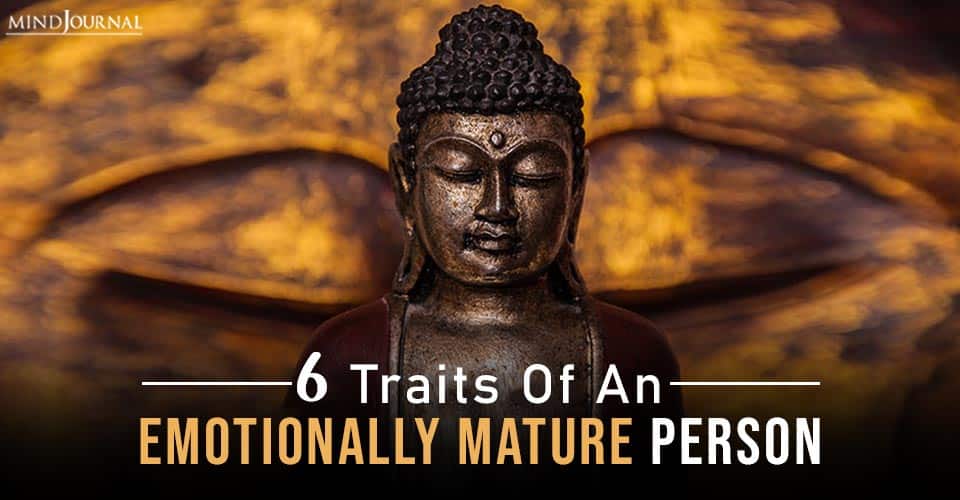Emotionally mature people are often misunderstood or looked down upon. Here are 6 traits of an emotionally mature person you should know.
In this day and age, emotional maturity has become indispensable for better living. The more emotionally mature we become, the easier it becomes to accept changes and adapt to reality.
But contrary to popular belief, age and literacy are in no way indications of emotional maturity. They’re just numbers that bear no intrinsic value when it comes to emotional maturity. A being as young as 13 can be more mature than a 60-year-old.
Take, for example, Anne Frank. She never lived past the age of 14, and yet the book she wrote, the emotions she expressed in it have been radiating its essence since the days of the Holocaust.
It is high time we start considering emotional maturity an intrinsic quality, and not just a measurement.
Here Are 6 Traits Of An Emotionally Mature Person
1. Being self-aware.
Self-aware people are usually found to be emotionally mature when compared with their peers. Not many fall in this category. And people mostly remain ignorant of themselves and the actions they take.
Being self-aware is about looking at yourself from an objective point of view. Understanding your strengths, limitations, and weaknesses is crucial in creating emotional stability. Things won’t always go in your favor.
Thus it is very important that you become increasingly aware of yourself, the external events, and how these things actually end up affecting you.
Read The Johari Window: How To Build Self-Awareness and Achieve Success
2. Being accountable.
Learning to deal with mistakes is one of the major traits of emotional maturity. The first thing you realize that we are all accountable for our actions and the choices we make. No more do you buy into the delusion that things happen by change.
The accidental view of life changes and you start holding yourself accountable for every event. You stop blaming fate and whining about how cruel and biased people are. You realize that the finger can be pointed to no one but yourself.
There is a gradual shift in the perception and you start looking at yourself as the prime mover of all the events that take place around you, including the ones that make you emotionally vulnerable. You are accountable for your own outcomes- that is the fundamental insight you gain in this stage.
3. Humility.
Modesty is one of the prime virtues of mankind. It is instrumental in maintaining health and positivity in a relationship. Arrogance only fuels our false sense of self-esteem and propagates violence in the form of emotional hazard.
But the one who nourishes within them enough humility is the one who can be truly regarded as an emotionally mature soul. It is humility that gives rise to the sense of equity. It is the stepping stone towards universal cooperation and brotherhood.
An emotionally mature person knows the value of being modest and humane, and thus never refrains from culturing humility as one of the best practices.
Read 12 Self Care Practices That Can Boost Your Emotional Intelligence
4. Acceptance.
Reality doesn’t always align with our demands. We as a population on this planet fake ourselves to compare and compete with our peers. But an emotionally mature person has reached a phase where they have realized the futility of comparing themselves.
They know how foolish it is to spend so much time and energy in such pursuits. Instead, they work on accepting the outcomes and be content with who they really are. They realize how meaningless it is to keep perpetuating the same process.
It is therefore wise to accept who we are, what we have and eventually make peace with ourselves.
5. Acknowledgement and gratitude.
We are getting drained of the habit of acknowledgment and thanksgiving. The world as we know it is already hesitant of being thankful to life.
But an emotionally mature person knows that even the smallest things that make us happy are more treasurable than gold itself. When we feel thankful for little things, our lives become the vessel of contentment and positivity. The more one demands from life, the more one turns out to be feverish.
This discontent and mental chaos eventually leads to severe dissatisfaction that can never be extinguished, but only fueled by more expectations and demands. An emotionally mature person sees the folly of this and is always thankful for whatever life has bestowed upon them.
6. Compassion.
In all the major religions across the world, compassion has been the key driving factor behind human welfare. Without compassion, there is no sense of brotherhood and communion among human souls.
An emotionally mature person has transformed themselves into a vessel of compassion because for them, human virtues outweigh any scope for selfish gains. They know that without compassion, humanity will eventually doom itself through conflict and greed.
Read 12 Tips To Self-Love And Compassion
The world inherited by the next generated, if lacks compassion, then would disintegrate into a cradle of decadence and individualism, solely concerned with material gain. The emotionally mature ones realize this and are motivated to cultivate as much compassion as possible.












Leave a Reply